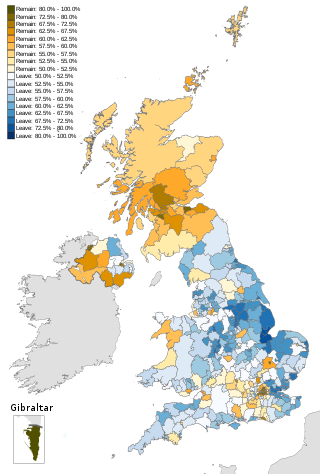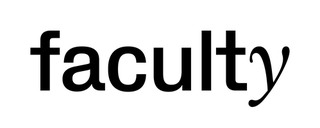A voter database is a database containing information on voters for the purpose of assisting a political party or an individual politician, in their Get out the vote (GOTV) efforts and other areas of the campaign.

Laura Juliet Kuenssberg is a British journalist who presents the BBC's flagship Sunday morning politics show.
Matthew Jim Elliott FRSA is a British political strategist and lobbyist who has served as the chief executive of a number of organisations and been involved in various referendum campaigns, including Vote Leave.

On 23 June 2016, a referendum, commonly referred to as the EU referendum or the Brexit referendum, took place in the United Kingdom (UK) and Gibraltar to ask the electorate whether the country should remain a member of, or leave, the European Union (EU). It was organised and facilitated through the European Union Referendum Act 2015 and the Political Parties, Elections and Referendums Act 2000. The referendum resulted in 51.9% of the votes cast being in favour of leaving the EU. Although the referendum was legally non-binding, the government of the time promised to implement the result.
Robert Leroy Mercer is an American hedge fund manager, computer scientist, and political donor. Mercer was an early artificial intelligence researcher and developer and is the former co-CEO of the hedge fund company Renaissance Technologies.

Brexit was the withdrawal of the United Kingdom (UK) from the European Union (EU) at 23:00 GMT on 31 January 2020. The UK is the only sovereign country to have left the EU. The UK had been a member state of the EU or its predecessor, the European Communities (EC), since 1 January 1973. Following Brexit, EU law and the Court of Justice of the European Union no longer have primacy over British laws. The European Union (Withdrawal) Act 2018 retains relevant EU law as domestic law, which the UK can amend or repeal.
Arron Fraser Andrew Banks is a British businessman and political donor. He is the co-founder of the Leave.EU campaign. Banks was previously one of the largest donors to the UK Independence Party (UKIP) and helped Nigel Farage's campaign for Britain to leave the EU.

Vote Leave was a campaigning organisation that supported a "Leave" vote in the 2016 United Kingdom European Union membership referendum. On 13 April 2016 it was designated by the Electoral Commission as the official campaign in favour of leaving the European Union in the Referendum.
Leave.EU was a political campaign group that was first established to support the United Kingdom's withdrawal from the European Union in the June 2016 referendum. Founded in July 2015 as The Know, the campaign was relaunched in September of that year with its name changed to "Leave.eu" to reflect altered wording in the referendum question.
Dominic Mckenzie Cummings is a British political strategist who served as Chief Adviser to British Prime Minister Boris Johnson from 24 July 2019 until Cummings resigned on 13 November 2020.
After the British EU membership referendum held on 23 June 2016, in which a majority voted to leave the European Union, the United Kingdom experienced political and economic upsets, with spillover effects across the rest of the European Union and the wider world. Prime Minister David Cameron, who had campaigned for Remain, announced his resignation on 24 June, triggering a Conservative leadership election, won by Home Secretary Theresa May. Following Leader of the Opposition Jeremy Corbyn's loss of a motion of no confidence among the Parliamentary Labour Party, he also faced a leadership challenge, which he won. Nigel Farage stepped down from leadership of the pro-Leave party UKIP in July. After the elected party leader resigned, Farage then became the party's interim leader on 5 October until Paul Nuttall was elected leader on 28 November.
The result in favour of Brexit of the 2016 United Kingdom European Union membership referendum is one of the most significant political events for Britain during the 21st century. The debate provoked major consideration to an array of topics, argued up-to, and beyond, the referendum on 23 June 2016. The referendum was originally conceived by David Cameron as a means to defeat the anti-EU faction within his own party by having it fail, but he misjudged the level of public support for leaving, particularly amongst Labour Party voters. Factors included sovereignty, immigration, the economy and anti-establishment politics, amongst various other influences. The result of the referendum was that 51.8% of the votes were in favour of leaving the European Union. The formal withdrawal from the EU took place at 23:00 on 31 January 2020, almost three years after Theresa May triggered Article 50 of the Lisbon Treaty on 29 March 2017. This page provides an overarching analysis of the different arguments which were presented by both the Leave and Remain campaigns.
Russian interference in the 2016 Brexit referendum is a debated subject and remains unproven, though multiple sources argue evidence exists demonstrating that the Russian government attempted to influence British public opinion in favour of leaving the European Union. Investigations into this subject have been undertaken by the UK Electoral Commission, the UK Parliament's Culture Select Committee and Intelligence and Security Committee, and the United States Senate. "The Russia Report" published by the Intelligence and Security Committee of Parliament in July 2020 did not specifically address the Brexit campaign, but it concluded that Russian interference in UK politics is commonplace. It also found substantial evidence that there had been interference in the 2014 Scottish independence referendum.

Christopher Wylie is a Canadian data consultant. He is noted as the whistleblower who released a cache of documents to The Guardian he obtained while he worked at Cambridge Analytica. This prompted the Facebook–Cambridge Analytica data scandal, which triggered multiple government investigations and raised wider concerns about privacy, the unchecked power of Big Tech, and Western democracy's vulnerability to disinformation. Wylie was included in Time magazine's 100 Most Influential People of 2018. He appeared in the 2019 documentary The Great Hack. He is the head of insight and emerging technologies at H&M.
In the 2010s, personal data belonging to millions of Facebook users was collected without their consent by British consulting firm Cambridge Analytica, predominantly to be used for political advertising.

Brexit: The Uncivil War is a 2019 British television drama film written by James Graham and directed by Toby Haynes. It depicts the lead-up to the 2016 referendum through the activities of the strategists behind the Vote Leave campaign, that prompted the United Kingdom to exit the European Union, known as Brexit. Benedict Cumberbatch stars as Dominic Cummings, the Campaign Director of the officially designated Brexit-supporting group, Vote Leave. Rory Kinnear stars as Craig Oliver, one of the leaders of the officially designated Remain-supporting group, Britain Stronger in Europe.

Faculty is a British technology company based in London, UK. It provides software, consulting, and services related to artificial intelligence. The company was founded in 2014, as a fellowship programme for PhD graduates. Some of its governmental and political work has attracted conflict of interest concerns.

R (Wilson) v Prime Minister [2019] EWCA Civ 304 is a UK constitutional law case, involving judicial review of the Brexit Referendum in 2016. The claimants, including Wilson, argued that illegality through Russian interference, criminal overspending by Vote Leave and criminal investigation into the largest donor, Arron Banks, before and during the referendum undermined the integrity of the result, and rendered the decision to leave void. The application was refused in the High Court. In December 2018, the claimants lodged an appeal to the Court of Appeal. This was rejected on 21 February.
Several allegations of unlawful campaigning in the 2016 EU referendum have been made. Some allegations were dismissed by the investigating bodies, but in other cases wrongdoing was established, leading to the imposition of penalties. Sanctions have included the levying of the maximum fine possible on Facebook for breaches of data privacy.
Victoria Woodcock was the operations director for the Vote Leave campaign for the 2016 referendum vote for the United Kingdom to leave the European Union. Dominic Cummings and Paul Goodman claim Woodcock was a key person to the success of the Vote Leave campaign for Brexit.








